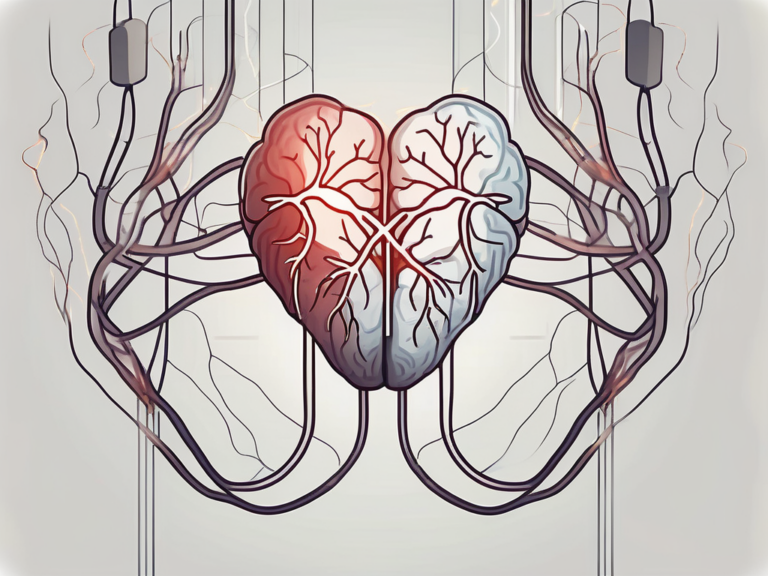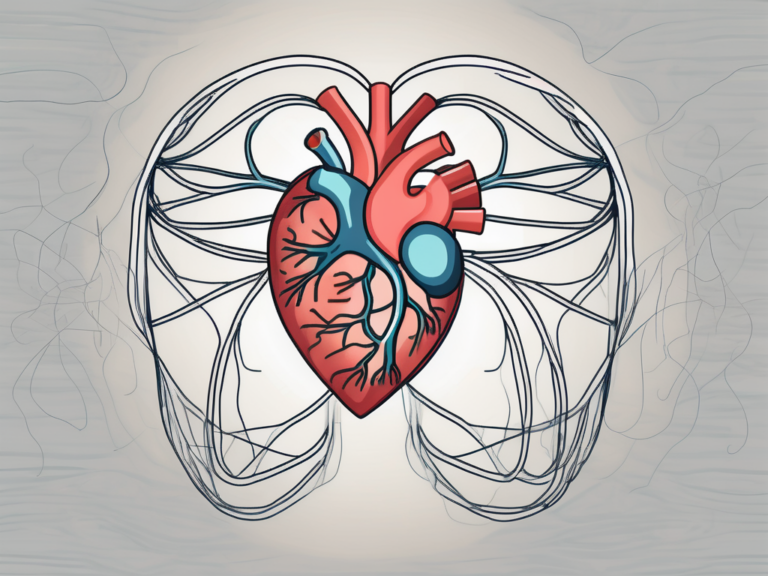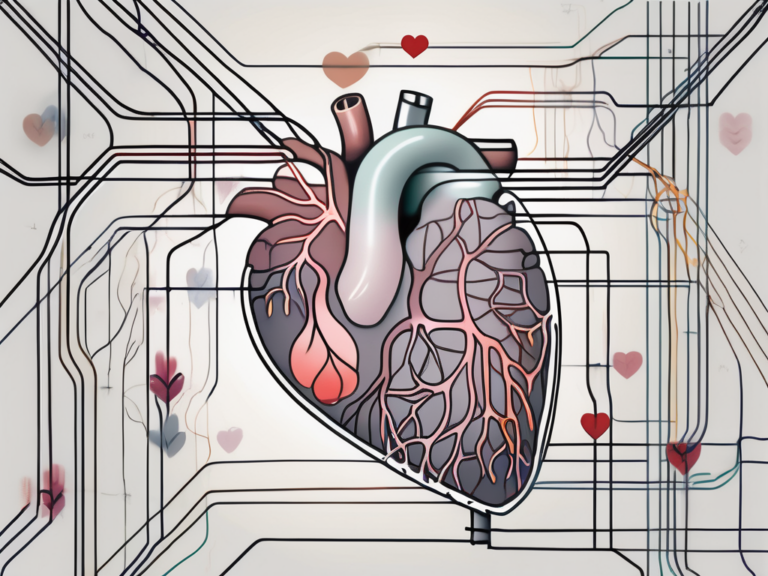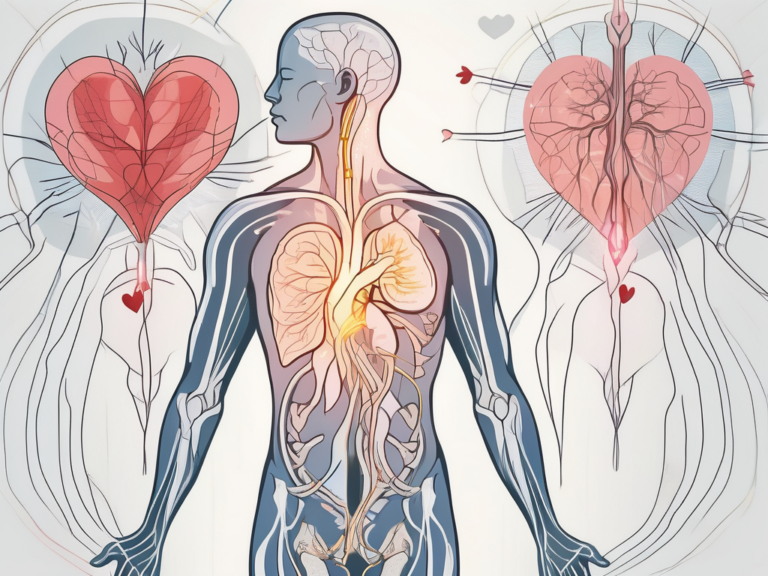Why Does My Heart Race When I Wake Up?
Ah, the mysterious phenomenon of waking up to a racing heart! It can certainly be a startling experience, leaving you wondering what in the world is going on inside your precious ticker. But fear not, dear reader, for today we shall embark on an amazing journey into the fascinating world of cardiovascular physiology and unravel the secret behind this morning puzzler.
Understanding the Physiology of the Heart
First things first, let’s get to know our cardio companion a little better. The heart, that wonderful organ responsible for keeping us alive and kicking, is like a bustling metropolis with a rhythm all its own. It beats tirelessly day in and day out, pumping blood and oxygen to every nook and cranny of our precious bodies.
But what makes our heart behave like a wild stallion at times? Well, my friend, it’s all about the hormones and signals dancing inside your body.
The Role of Adrenaline in Heart Function
One of the key players in the symphony of your heart’s rhythm is adrenaline. This powerful hormone, secreted by our trusty adrenal glands, is like the coachman who encourages our heart to pick up the pace. When we wake up, our body releases a surge of adrenaline to help us transition from a state of rest to a state of readiness.
So, if you’re waking up with your heart galloping like a racehorse, it’s likely that your body is simply revving itself up for the day ahead.
The Impact of Sleep on Heart Rate
Speaking of waking up, have you ever stopped to think about how sleep affects your heart rate? Well, my curious friend, it turns out that sleep has a rather intricate dance with our heart. During the different stages of sleep, our heart rate can fluctuate, and it’s not uncommon for it to speed up as we transition from the cozy world of dreams to the glorious realm of consciousness.
So, the next time you wake up with your heart doing the tango, remember that it’s just your body’s way of saying, “Good morning, sunshine!”
Potential Causes of Morning Heart Racing
Now that we’ve laid the groundwork for understanding our heart’s morning shenanigans, let’s delve into the possible reasons behind this spirited wake-up call.
Anxiety and Stress-Related Factors
Ah, anxiety and stress, the notorious troublemakers of our well-being. They have a special knack for hijacking our calm and sending our heart into a frenzy. If you find yourself waking up with your heart playing a high-speed drum solo, it might be a signal that stress and anxiety are dancing their way into your dreams.
But fear not! There are ways to tame this wild beast and find your inner calm. Deep breathing exercises, meditation, and cultivating a peaceful bedtime routine can all help keep your heart at a steady rhythm.
Physical Health Conditions
Sometimes, our racing heart in the morning can be a sneak peek into an underlying physical health condition. Issues like an overactive thyroid, low blood sugar levels, or even certain medications can stir up some commotion in the heart department.
So, if your morning wake-up calls persist and leave you feeling more like an extra in a heart-pounding action movie, it might be worth paying a visit to your friendly neighborhood healthcare provider for a check-up.
Lifestyle and Dietary Influences
Let’s face it, dear reader, our lifestyle choices and dietary habits can have a profound impact on our heart’s behavior. Caffeine, nicotine, and excessive alcohol consumption can all have our heart pumping faster than a squirrel on a caffeine high.
So, if you suspect that your morning mug of java might be contributing to your heart’s early morning raves, try dialing it back a bit or opting for a herbal tea instead. Your heart will thank you for the brew-tiful change!
The Connection Between Sleep Disorders and Heart Racing
Now, let’s explore the intriguing relationship between sleep disorders and our heart’s early morning adventures.
Sleep Apnea and Heart Rate
Have you ever heard of sleep apnea? It’s a sneaky sleep disorder that disrupts your breathing patterns during slumber, causing multiple awakenings throughout the night. And guess what? Sleep apnea can also lead to a racing heart in the morning.
Why does this happen? Well, dear reader, it’s all because of the magical dance between oxygen levels and our heart’s rhythm. When our breathing gets disrupted during sleep, the drop in oxygen levels triggers a response in our body, causing our heart to beat faster to compensate for the lack of oxygen. Sneaky, right?
Insomnia’s Impact on the Cardiovascular System
Insomnia, that relentless sleep thief, can also leave its mark on our heart’s beat. When we struggle to catch those elusive z’s, our body has a way of retaliating, and sometimes that means waking up to a bungee-jumping heart.
This lack of sleep can affect the balance of various hormones in our body, including those responsible for regulating our heart rhythm. So, if insomnia has made you the unwilling member of an impromptu midnight cardio session, it might be time to explore sleep remedies and establish a more consistent bedtime routine.
When to Seek Medical Attention
While the occasional morning heart race can often be a benign quirk of our body’s magnificent symphony, there are certain situations where seeking medical attention is crucial.
Recognizing Serious Symptoms
If your morning heart racing is accompanied by chest pain, dizziness, shortness of breath, or any other alarming symptoms, do not pass Go, do not collect $200—seek medical attention immediately. These symptoms could be a sign of a more serious underlying condition that requires prompt evaluation and treatment.
The Importance of Regular Check-ups
Regardless of the severity of your morning heart racing episodes, it’s always a good idea to keep up with regular check-ups. Your healthcare provider can monitor your heart health and provide valuable insights on how to keep your ticker in tip-top shape.
Remember, dear reader, knowledge is power, and staying on top of your health is the key to cruising through life with a happy and harmonious heart.
Ways to Manage and Prevent Morning Heart Racing
Now that we’ve unraveled the enigma behind morning heart racing, let’s explore some strategies to manage and prevent these exhilarating wake-up calls.
Relaxation Techniques and Stress Management
When it comes to taming the wild horse of morning heart racing, incorporating relaxation techniques into your daily routine can work wonders. Deep breathing exercises, relaxation apps, and mindfulness practices are all powerful tools to help you find your inner calm and keep your heart in check.
If stress seems to be the culprit behind your morning heart’s grand prix, consider seeking support from a therapist or counselor. Sometimes, a little extra help can go a long way in finding peace amidst the morning frenzy.
Dietary Changes and Exercise
As we’ve learned, what we put into our bodies can have a direct impact on our heart’s behavior. So, why not fuel your heart with love and nutrients? Incorporating a heart-healthy diet, rich in fruits, vegetables, whole grains, and lean proteins, can help keep your ticker happy and humming.
And let’s not forget about exercise! Regular physical activity gets our heart pumping in all the right ways. So, lace up those sneakers, take a brisk walk, dance like nobody’s watching, and let your heart soar with joy.
Medical Treatments and Interventions
If all else fails and your morning heart racing persists despite your best efforts, it might be time to consult with a healthcare professional. They can assess your unique situation, delve deeper into the underlying causes, and recommend appropriate medical treatments or interventions.
Remember, dear reader, you don’t have to face the morning heart racetrack alone. Your healthcare team is there to guide you towards a smoother and more peaceful wake-up call.
So, the next time your heart decides to kickstart your morning with an adrenaline-fueled adventure, take a moment to appreciate the intricate dance of hormones and signals within your body. And remember, through understanding and care, you can keep your heart racing to the beat of your own beautiful life.






